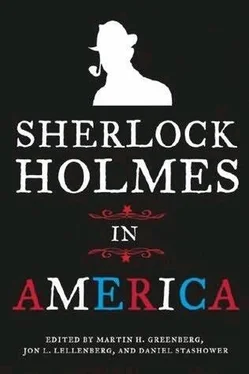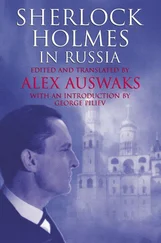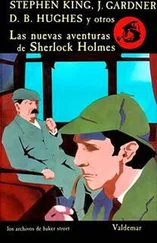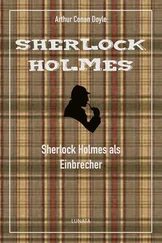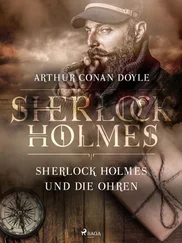Once back inside the Lomaland grounds, Holmes stopped the first person we saw, a young woman carrying a book. “Do you know where Mrs. Tingley is at this moment?”
“I believe she is taking tea at her house.”
By the time we arrived at Mrs. Tingley’s modest cottage, we were very much out of breath. Holmes flung open the door and we raced through the foyer and found Mrs. Tingley sitting with the Spaldings at a tea table on the rear porch.
In front of her sat a plate with a dripping honeycomb on it. She had lifted her spoon and was about to plunge it into the comb when Holmes whisked the plate away from her.
She raised an eyebrow and said, “What is the meaning of this, Mr. Holmes? I am quite looking forward to my little treat.”
“This treat would be your last, Mrs. Tingley,” Holmes said. “This comb is not from the hives Mrs. Imbler tends. Instead, it comes from a hive hidden deep inside an oleander grove. This honey is poisonous.”
“I knew it!” Elizabeth Spalding said. Her plate contained bread and jam, no honey. “I knew I was right to bring Mr. Holmes here. He has saved you from that presumptuous beekeeper.”
“But would this honey really have killed me, Mr. Holmes?” Mrs. Tingley asked. She seemed almost amused at the prospect of having nearly eaten it.
“It is not unknown for honey to be tainted with the nectar of whatever plants the bees feed upon,” Holmes pointed out. “Cases have been documented in Greece and New Zealand. Those poisonings were, of course, accidental, but one who knows the principles of bee culture could easily arrange for his hive to feed upon poison flowers. Such was the case with Jonas Imbler.”
I started, as did Mrs. Spalding. “Jonas Imbler?” she said with a gasp. “But surely it was Grace Imbler who wanted Mrs. Tingley gone.”
“No, madam, your suspicions of Mrs. Imbler are quite unfounded. She did not create the rogue hive in the oleander bushes. Her husband, who is also a skilled beekeeper, did.”
“Holmes,” I protested, “you distinctly said you were hunting a murderess. Did you mislead me on purpose?”
He smiled. “I was referring to the bee. The workers are female; the workers made this honey; ergo, the workers are murderesses. Q.E.D.”
“But why?” Albert Spalding protested. “Imbler has shown no interest in Theosophy and would never wish to become head of the Brotherhood. What reason could he possibly have for murdering Mrs. Tingley?”
For once, I had an answer at the same time as Holmes. He opened his mouth to explain, but I found my voice first. “Not all husbands are as tolerant as you, Mr. Spalding,” I said. “You are content to live here on Point Loma because your wife is a part of this community. You busy yourself with your golf and your civic activities and you are happy here. It was clear to me at our meeting that Jonas Imbler felt very differently. He chafed under the rule of a woman. He resented his wife’s commitment to the Brotherhood and her responsibility for the beehives.”
Holmes nodded and picked up the rest of the tale. “The bees failed to pollinate the avocado trees because their queen was gone,” he explained. “Queenless bees cannot survive. They were queenless because Jonas Imbler removed the queen to start his rogue hive in the oleander grove. The sabotage of the pollination experiment was a mere byproduct of his larger scheme to murder Mrs. Tingley. Without her, he felt sure the Society would fail and his wife would be willing to leave Lomaland.”
“It seems a strange way to commit murder, Mr. Holmes,” Mrs. Tingley said. “Surely there are more straightforward methods available to one who is determined to kill another human being. Poisoned honey seems rather a roundabout way to do it.”
“Roundabout, yes,” Holmes replied, with a small smile. “But for Jonas Imbler, it had the virtue of poetic justice. He saw you, Mrs. Tingley, as the queen bee of Lomaland, and he felt that one queen deserved death at the hands of another.”
Mrs. Spalding’s face continued to wear its stubborn look. “How can you be sure,” she asked, “that Mrs. Imbler was not her husband’s willing accomplice?”
Holmes shook his head. “I am convinced that Mrs. Imbler knew nothing of her husband’s activities. She might be capable of murder; I believe most people are. But she would never use her bees as weapons. She has far too much respect for them. It would be,” he added, turning to me, “as if our own Mrs. Hudson were to put poison into her breakfast porridge.”
I hastily agreed that this was not to be contemplated. I could see that Mrs. Spalding was not mollified, but Mrs. Tingley nodded her agreement.
“The soul is not invisible, Mr. Holmes,” she pronounced. “It reveals itself in our every waking action. And Mrs. Imbler has shown me a soul devoted to order and peace. Her well-tended hives are her character reference.”
We stayed one more night with the Spaldings before returning to the Hotel del Coronado. It was a night of sheer magic, for the magnificent orchestra played exquisitely as the sun lowered itself into the Pacific and the lights went on, one by one, inside the glass globes over the domes of Lomaland.
I stole a glance at Holmes. He was entranced by the music, and I saw another glimpse of the child he had once been as I watched a tall, slender boy of about twelve raise his violin to his chin and draw his bow across it.
THE ADVENTURE OF THE MISSING THREE QUARTERS by Jon L. Breen
Jon L. Breen, the winner of two Edgar Awards in the biographical/ critical category, has contributed to six previous Sherlock Holmes anthologies. He is the author of eight novels, including the Dagger Award-nominated Touch of the Past , and around a hundred short stories. His reviews appear regularly in Ellery Queen’s Mystery Magazine and Mystery Scene , and frequently (and non-politically) in The Weekly Standard . His latest books are the comic courtroom novel Probable Claus (Five Star) and A Shot Rang Out: Selected Mystery Criticism (Surinam Turtle).

Although I was a freelance American correspondent for several English newspapers, joining the crowds of ink-stained wretches attending the latest famous personality’s arrival in Chicago was never part of my usual regimen. So it was purely by chance that autumn afternoon in 1907 that I was at Grand Central Station on West Harrison Street to see Sherlock Holmes’s unheralded arrival. I had known him years before, and apart from my pleasure at seeing him again, I had hopes of an exclusive story to impress my Fleet Street masters.
“Clive Armitage, Mr. Holmes. We met-”
“I remember you well, Armitage, and I am pleased to greet a fellow Londoner. You are fully Americanized, I see.”
“It’s true I’ve been here several years now, and some say I’m developing an American accent, though I can’t hear it myself. Why do you think me Americanized?”
“Your tiepin and cufflinks identify you as member of some sort of baseball supporters club, and the handle of your walking stick depicts an ornate American eagle. You appear to be chewing gum, a habit that has not yet infected British journalists in my experience.”
“A representative of the Wrigley Company gave me some samples when I was working on a feature article about them,” I said somewhat defensively. “Wrigley is something of a Chicago success story, and I was assured their products will one day span the globe, so be warned.” Then, like a thespian belatedly remembering his lines, I exclaimed, “That was a truly amazing demonstration of your undiminished powers.” It wasn’t actually so amazing once he explained it, but I was not above flattery in search of a journalistic coup. “When I came to America, I feared I would miss reading about your adventures in The Strand , but Collier’s Weekly has filled the breach. Didn’t I hear that you had retired, though, beekeeping in Sussex or some such thing?”
Читать дальше
